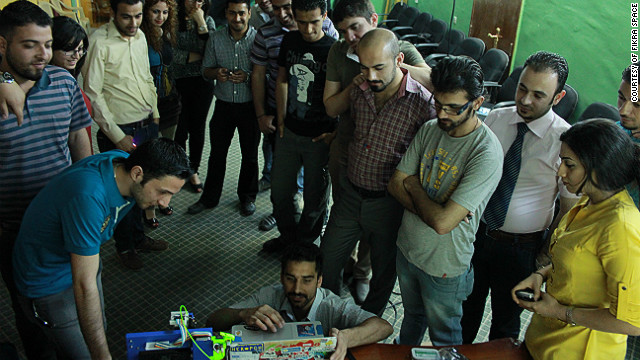CNN
by Tim Hume
29 Jan 13
thanks to goodnewsnetwork.org for the find
Politicians, generals and clerics have all played their part in shaping the new Iraq, with varying results.
Now the geeks are giving it a shot.
In recent months, Baghdad residents from science, engineering and tech backgrounds have been meeting regularly to participate in Iraq's first "hackerspace."
Known as Fikra Space, from the Arabic word for "idea," this open-access laboratory is intended as a technological playground to promote collaborative innovation, entrepreneurship -- and potentially solutions to some of the problems facing the country.
"There's nothing else like this here," said Salih Ammar, a 16-year-old high school student with an interest in smartphone technology, who has become heavily involved in the project. "It's open for all people, no matter their ages and their religion."
….
The hackerspace concept, where participants were free to drop in, experiment with specialist tech equipment and share ideas, has been imported to Iraq via Bilal Ghalib, a 27-year-old Iraqi-American. Ghalib became involved in hackerspaces when he visited about 50 across the United States in 2009, shooting footage for a possible documentary.
Entrepreneurship is putting control back into your hands and letting you create what you want to see and make a living doing it
Bilal Ghalib, hackerspace advocate
The model, he told CNN, had originated in Germany in the 1990s, but had taken off in the U.S. in the wake of the global financial crisis, as skilled, newly unemployed people sought different ways to re-tool and channel their energies in a more entrepreneurial way.
Ghalib says he saw parallels with the situation across the Middle East where a young generation looking for greater control of their own destinies were being worn down by high unemployment and political instability.
"How do you look into the future and see your (hand) in it?" he added. "That's what entrepreneurship is, putting control back into your hands and letting you create what you want to see and make a living doing it."
Ghalib started Fikra Space during a flying visit to Iraq in October, paid for through crowd-funding to his organization GEMSI (the Global Entrepreneurship and Maker Space Initiative).
Having put the word out through online networks, he convened a series of workshops to demonstrate the new technologies people could play with in the setting -- such as a 3D printer -- and to introduce them to the ethos of the hackerspace itself.
Since then, the group, which meets in the offices of a local journalism institute, has been drawing as many as 30 active participants to its meetings, held weekly if security allows, said Fikra Space member Mujtaba Zuhair.
….
The "open-source," everyone-is-welcome philosophy that underpinned the project is also unique.
"There aren't many communities in Baghdad that operate like this," said Zuhair, who has been using his time in the lab to conduct experiments in home automation -- connecting items in the home to a network which can be operated through a mobile phone.
….
"The most interesting thing is the people themselves, the people who want to help their community and others," said Ali Mohammed, a 21-year-old student of materials science and engineering who uses the labs to further his interest in artificial intelligence.
Along with others behind the space, he hopes the lab might eventually prove an incubator that could generate products and services providing solutions for problems facing Iraq.
"The problem here in Iraq is that people have lost hope in making things," said Zuhair. "People became unused to making things -- they just wanted to survive. If someone has a great idea they will get discouraged. But the new generation want to change, and they're looking for other people like them who want to change."
To this end, Ghalib has had a similar hand in the establishment of hackerspaces in Lebanon and Egypt -- operating on the basis that he helps seed the idea, then lets the community take over -- and has a vision for a chain of similar spaces throughout the region. "I want to see 1,000 hackerspaces from Turkey to Morocco," he said.
Ghalib added that you don't need to spend long in Iraq to be exposed to the challenges the country faces -- when he was in Baghdad, explosions occurred close to where he was staying -- and the Middle Eastern hackerspaces had some way to go before they began generating solutions to those problems.
He acknowledges that his faith in the hackerspace concept has previously been described as "irrationally optimistic" -- but says that's a good fit for the city.
"I think that's the only way to be when you're working in a place like Baghdad," he said. "I believe it's this type of optimism that will allow me and others around me to look past the challenges that surround us, and begin to do something."
http://www.cnn.com/2013/01/29/world/...kra/index.html





